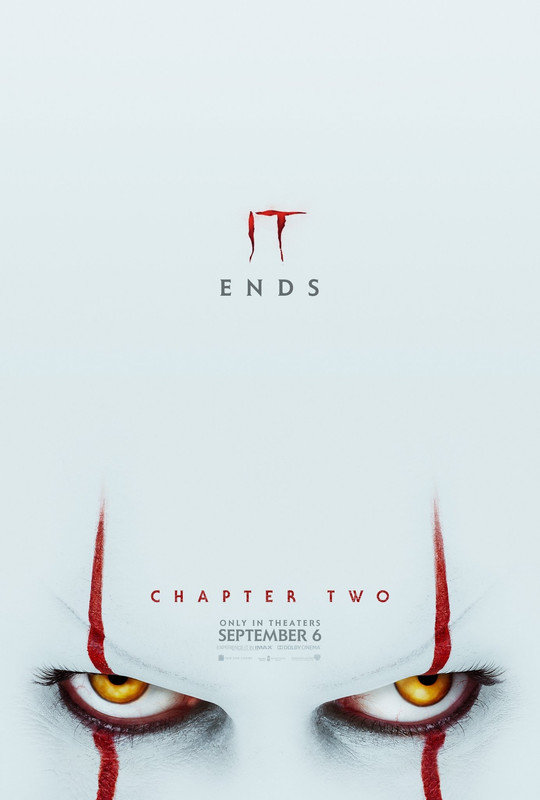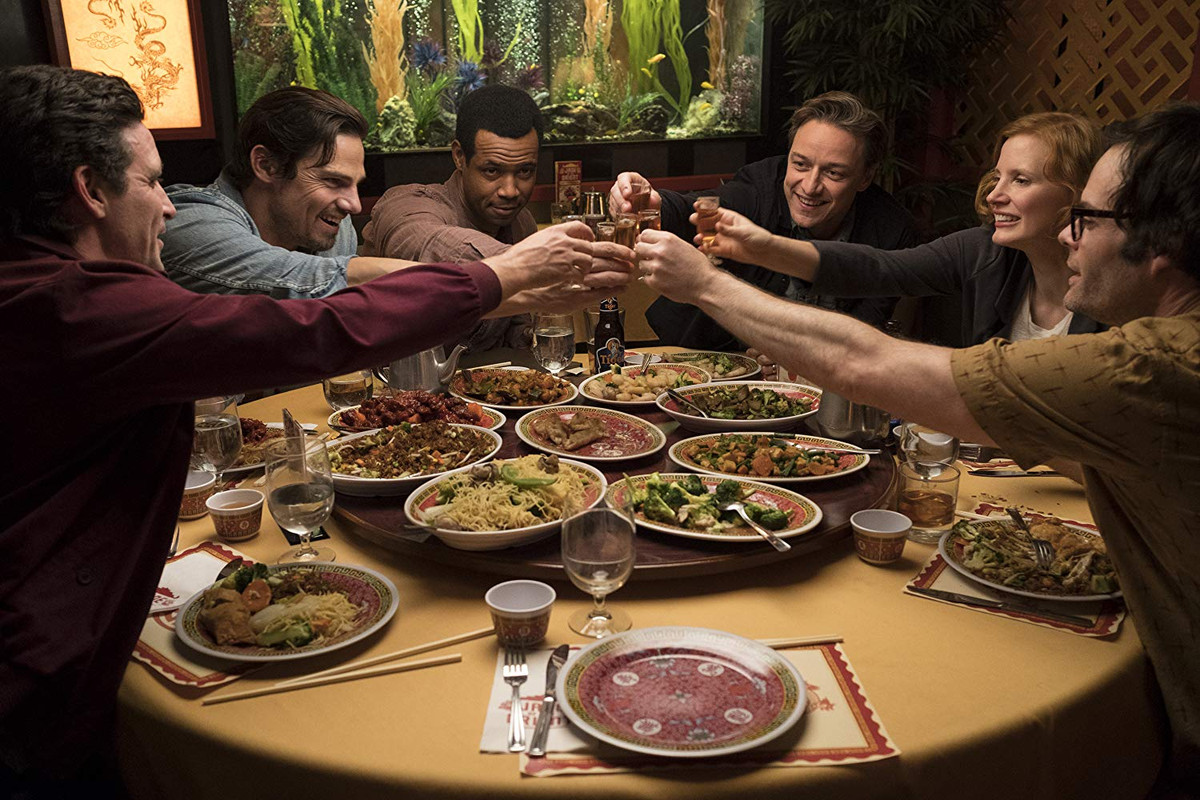Dir: Andy Muschietti
The first part of this adaptation of one of Stephen King’s best regarded novels became, on its 2017 release, the highest grossing horror film of all time (albeit unadjusted for inflation), so it makes sense that director Andy Muschietti has been afforded expanded freedoms for this second and final instalment. It’s probably not coincidental that the finished film is a good argument for reining a director in.
We pick up the action 27 years after the end of the last film, with the Losers Club now far-flung and having been out of contact and, with the exception of Mike Hanlon (Isaiah Mustafa), out of Derry since shortly after the summer they believed they defeated Pennywise (Bill Skarsgard). When a man is murdered, Mike discovers writing in blood that tells him Pennywise has returned, and he must reunite the Losers to finally destroy him once and for all.
It’s tough to argue with the quality of many aspects of It: Chapter Two. Cinematographer Checco Varese, production designer Paul D. Austerberry and art director Nigel Churcher all help craft a striking look for the film. Scenes with Bill (James McAvoy) trapped in a funhouse and Richie (Bill Hader) seeing Pennywise floating above him, hanging from a pyramid of red balloons are particularly strong images in their own right. The good work in the behind camera departments continues with some effective transitions between past and present, some achieved via effects and others through Jason Ballantine’s editing, and there is excellent practical effects work from the make up department, notably the Pennywise unit and largely successful de-aging CGI on the kids, who have all grown since the first film. The join is only visible on Finn Wolfhard, who obviously needed more work to match his look from the first film and can occasionally appear a bit waxy in the flashback sequences. Unusually, the film’s MVP is arguably casting director Rich Delia who, having found a talented group of kids for the first film, matches them brilliantly both in look and personality with the adult cast here.
With all this quality work in departments that don’t often get singled out for notice, it’s disappointing that where It: Chapter Two falls down is in the key aspects of its writing and direction. The film starts well enough, with a genuinely shocking and nasty scene of a gay bashing murder (with filmmaker Xavier Dolan playing the victim), but inconsistency soon rears its head.
Gary Dauberman’s screenplay is bitty and episodic, often putting its emphasis on the wrong things. In the long search for ‘tokens’ the Losers have to sacrifice to help them defeat Pennywise, only a couple feel hugely significant to the characters, Bev’s (Jessica Chastain) postcard being the one we feel the owner has the deepest connection to. Criminally, Bill’s bike feels more like his token, given the emphasis put on it during the sequence, than what it turns out to be. Some of the problems with the writing, like the nuance free depiction of characters like Bev’s abusive husband, can be traced back to Stephen King, who never wrote a bully who wasn’t pure unvarnished evil, but Dauberman should have been able to use the film’s massive running time to draw the story together more effectively, and to find something for Mike Hanlon to do aside from spout exposition. A running gag about Bill (King’s self-insert author in this story) not being able to write satisfying endings is not only tiresome, making a joke about something doesn’t mean it’s not true.
Like Dauberman, Andy Muschietti seems to struggle with the unwieldy length of his film (169 minutes, longer than 2001, The Life and Death of Colonel Blimp and recent byword for self-indulgent overlength, Once Upon a Time… in Hollywood). The pacing is notably stop/start, with the film cramming in the exposition in the opening twenty minutes, with scenes so brief to establish where the Losers Club are now that they feel pat and tossed off. After the first act, every single scene is drawn out long beyond the time at which its point is made. This is especially true of the token seeking scenes and the funhouse sequence, all of which could easily lose a third of their running time. This is all without taking account of scenes that could be cut wholesale, such as every last frame involving Henry Bowers (Teach Grant), another of King’s one note bullies, and entirely superfluous here.
Only in a couple of sequences does Muschietti show any knack for building atmosphere, and in both the funhouse and Beverly’s encounter with an old lady who lives in her former home, he manages to undermine what creeping fear he does engender, either with a laughable monster or poor pacing. Otherwise, the film’s scares are the typical ‘boo’ jumps. Some work, if only as a result of the law of averages, but they can almost all be counted in.
The acting is better than the screenplay and direction deserve. Chastain is the biggest name here but, while she’s typically good, she’s not a standout the way Sophia Lillis was, and remains among the teenage cast. McAvoy is also effective as the older Bill, convincing us of the long held guilt his character feels over ‘abandoning’ his little brother to Pennywise and the scene in which he works through that is one of the film’s best moments. The adult cast all channel their young counterparts, capturing the same essence and energy, suggesting both that our essential natures never really change and that, when drawn back together, they fall easily into old relationships. This is the film’s most affecting material, as it advances the coming of age stories that were the most compelling aspect of Chapter One.
Among the adult Losers, the best performances come from Bill Hader as Richie and James Ransone as Eddie, the latter now somewhat meeker but still the risk averse person he was as a kid. Hader’s performance has both the emotional content of his work on The Skeleton Twins and the sharp comic timing he always shows, but he isn’t always well served by the script, which puts too much emphasis on his wisecracking, often puncturing potentially scary scenes with gags that, while well delivered, aren’t funny enough to justify undermining the horror element of what is supposed to be a horror film. Equally, the secret that Pennywise taunts Richie with, obvious as it is, appears to be set up to pay off in a bigger way, and while the way it’s depicted is heartfelt, it doesn’t land with the emotional punch the setup promises. Ransone, who made a strong impression in the Sinister films, might give the best performance of the whole Losers Club, struggling to overcome the hypochondria of his childhood which has led into work as a risk analyst, not a personality type best suited to fighting a demonic clown. As Ben Hanscom, Jay Ryan’s character is, for the first two acts, often little more than a soundalike of his surname. Ben’s story only comes into focus in the final act, but at least that’s more than Isaiah Mustafa gets as Mike, the film’s sole black character finding himself sidelined for large swathes of a second film in a row.
The other key cast member here is Bill Skarsgard as Pennywise. While the make up does a lot of work for him, the actor inhabits it brilliantly. Almost every element of the film’s pure horror scenes that works is thanks to his deeply weird and unnerving performance. This is particularly true when Pennywise attacks a little girl under the bleachers at a baseball game, Skarsgard’s childlike voice only adding to the skin-crawlingly horrible feel of the scene.
It would be unfair to say that It: Chapter Two is a bad film, there are too many well crafted elements for that to be true. The film comes into focus just often enough to make you think that buried somewhere in this morass of footage is a genuinely frightening film about the things that haunt us from our childhood. Unfortunately, to find that movie you have to pick through an overlong and digressive collection of scenes that often feel like they are stuck in the same inert state as the lady Bev has tea with. Muschietti is capable both of boring us with his longueurs and of making us groan with his painfully obvious allusions to films infinitely better than this one (from the King universe and outside). Next to these moments, the scenes that do manage to grip or to scare don’t add up to enough to allow the film to work as a whole. Taken together with the equally overlong and patchy Chapter One, there may be a way to carve out a great four hour film, but these two hours and forty nine minutes are only sporadically interesting.
★★½



I think you're being charitable.
ReplyDelete